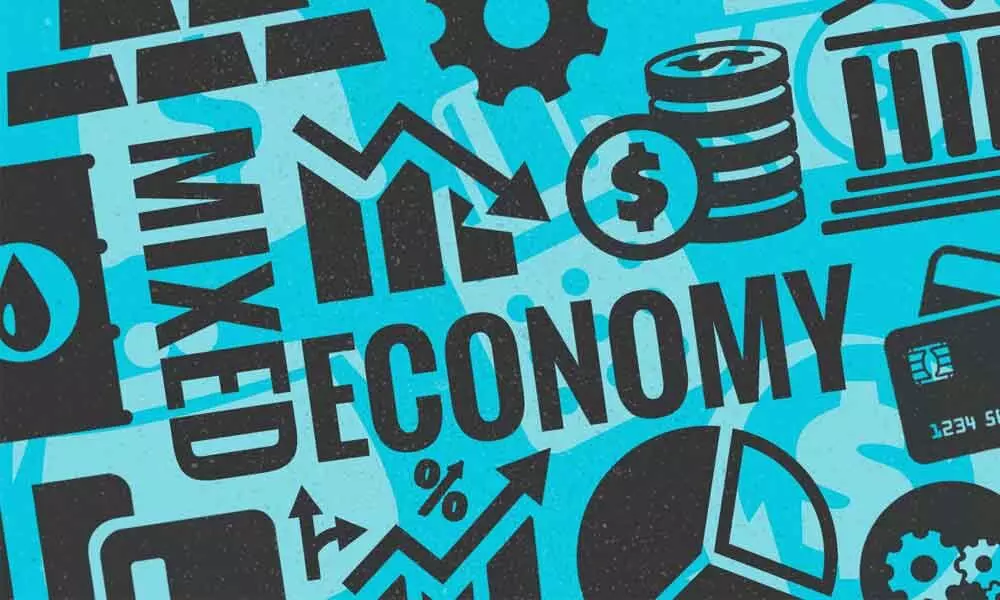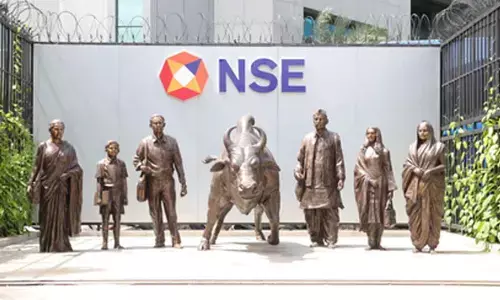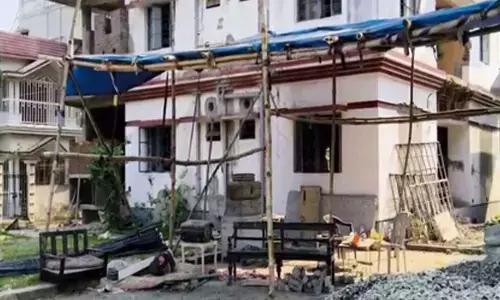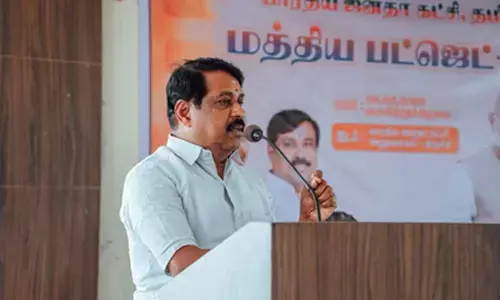Saving economy key for India

Cutting salaries during this difficult period will push economy into more chaos as consumption levels will nosedive
These days, it's a scary prospect to step out to pick groceries in Hyderabad even though the lockdown is in place to control the spread of deadly coronavirus. This is not to say that the lockdown has completely failed in the City of Pearls.
More than 90 per cent of people confined themselves to their homes. But the problem is with remaining 10 per cent who are taking to the streets on one pretext or the other.
Interestingly, some people are not even bothered to wear masks, let alone maintaining social distancing - a medical imperative to keep away COVID-19 pandemic caused by a novel coronavirus, for which neither vaccine nor proven medical treatment is available currently. I don't think the situation is any different in other cities and parts of the country. It's scary. Isn't it?
But if this continues, then what is the use of the lockdown which is causing immense damage to the economic fabric of the country? Going by the current trends, COVID-19 has already reached third stage, the community level transmission, in India as people with no prior history of travel and contact with infected persons, fell prey to the virus in some parts of the country, including Telangana.
People in power may deny it, but that's the undeniable truth. So, it's time for the Centre to strictly enforce the lockdown. Otherwise, it will be next to impossible for India to contain the pandemic if it spreads to the poor. And the associated economic cost will be immense.
In its latest outlook report, global rating agency Fitch slashed India's GDP growth forecast for the current fiscal year (2020-21) that began on April 1, to measly two per cent, a 30-year low.
In December last, the same agency projected the country's growth in FY21 at 5.6 per cent before cutting it down to 5.1 per cent on March 20 this year. Why did the agency go for a drastic revision of its growth projections in just two weeks? The answer is crystal clear.
A global rating agency like Fitch is not in a position to fathom the gravity of economic crisis that prevails in India and around the world. Frankly speaking, Fitch is overly optimistic when it says India will clock two per cent GDP growth in FY21.
My take is that India's economy has already started shrinking thanks to corona crisis. The first signs of it will come out when India's official statisticians release GDP numbers for last quarter (January-March 2020) of last fiscal a few weeks later.
The contraction in GDP will continue in the current fiscal as well. Our governments and the leaders who helm them should evolve a plan that could contain the spread of coronavirus while minimizing damage to the country's economy.
If this is not done, India will find itself in a deeper mess which will, for sure, keep the country on the mat for a prolonged period.
But what should be done to contain the pandemic? The Modi government did a laudable thing by announcing national lockdown on March 24.
It is there for all to see what is happening in the so-called developed countries like Italy, the US and Spain, where hundreds of people are dying of COVID-19 and thousands more are getting infected with the virus every day.
India would have been in similar situation, but for the lockdown. But the 21-day lockdown period will end on April 14 and it is very unlikely that the country will eliminate the threat of coronavirus by that time.
It is well and good if the Centre extends the lockdown period. If not, it should have a proper exit strategy to see that the benefits of the 21-day lockdown are not wasted. Otherwise, COVID-19 will simply explode and ravage the country with renewed vigour.
On the healthcare front, the Centre should identify COVID-19 hotspots and continue lockdown in these hotspots for another two weeks to one month.
It should declare health emergency and make it mandatory for all people suffering from any type of fever in the country to get tested for COVID-19.
Family members should be held responsible and cases should be filed against them if they don't alert the government when someone from their family gets fever or develops other symptoms associated with COVID-19.
Further, testing should be made affordable. Private hospitals and diagnostics centres should be directed to carry out tests at a fixed, affordable price on no-profit basis.
Moreover, all international passenger flights should be banned at least for six months more or until the pandemic subsides in all major economies.
Domestic flights should also be put on hold for some more time as most of the metro cities are hotspots for the pandemic now. Inter-State travel also should be banned for some more time.
We need to remember that for India, the war against the coronavirus has just begun. If someone thinks that India and Indians will be safe after the 21-day lockdown ends, it is nothing, but sheer foolishness.
On the economic front, the Centre has to do a lot more for reviving GDP. The Reserve Bank of India (RBI) announced a slew of measures including moratorium on term loans and deferment of interest payments on working capital.
But borrowers complain that banks are not implementing these relief measures. Many banks are said to have already deducted March quarter interest on working capital provided to MSMEs, which are under immense financial stress due to lockdown that crippled their operations.
If no concrete support comes from the Centre and States, MSMEs will be in deep trouble, which will hurt the economy in long run. The Centre should also announce major economic package for industrial sector and see that State governments pay all the pending incentives to industrial units.
However, the Centre did a right thing by announcing a Rs 1.7-lakh crore relief package that puts more money into the hands of the country's poor for next three months.
It's a good move not just because it will provide succour to the poor and needy, but also because it will increase consumption levels which will benefit overall economy in these troubled times.
But sadly, some State governments are doing quite opposite, harming the economy in the process. Telangana Chief Minister K Chandrashekar Rao announced a steep salary cut for the State government employees.
Telangana has been a revenue surplus State since its creation in 2014. So, it's a surprise for many that Telangana is not in a position to pay salaries for its staff after a mere 10-day lockdown in March.
Taking cue from Telangana, Andhra Pradesh also deferred payment of 50 per cent of salaries for its employees. When a revenue surplus State like Telangana cuts salaries, can AP haunted by widening fiscal and revenue deficit afford to be different? Other State governments may also follow suit.
When governments cut salaries, private companies will simply stop paying salaries altogether. Obviously, governments will not have any moral right to ask private companies to pay salaries when they themselves are not doing so.
But cutting salaries during this difficult period will push the economy into more chaos. Such steps will make people lose confidence. Further, consumption levels will nosedive, which will in turn bring down economic growth.
If that happens, the economy will simply collapse. While economy reels under supply side shocks during lockdown, the demand side shocks will take a further toll on it after lockdown ends, if people don't have money in their hands.
Hope better sense prevails on the governments when it comes to staff salaries as saving the economy holds key to India's final victory against COVID-19 pandemic.
Anyway, Prime Minister Narendra Modi did a right thing by asking people to switch off regular lights and light candles or diyas at their doorsteps or balconies for nine minutes from 9 pm on April 5 (today).
People can also extend their solidarity by using a torchlight or flashlight on their mobiles. This may look foolish for some or symbolism for others. But people are going through an unprecedented crisis.
They are worried about their future. They are worried about their jobs, businesses, companies and what not. People are also worried whether they can go back to work. If yes, when? In such trying times, an exercise like this will infuse some hope into lives of 1.3 billion Indians, especially the poor who eke out a living on daily wages.
That way, PM's appeal is worth emulating. But we have a valuable lesson to learn from the ongoing corona crisis. The lesson is that living is going to be a luxury in the coming years, not the yearning for a luxurious life.









